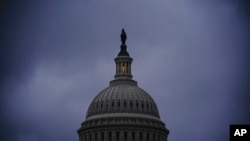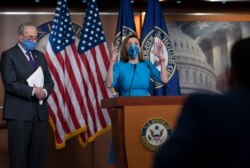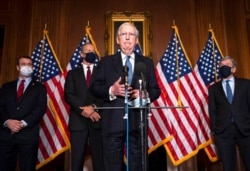U.S. lawmakers have yet another new coronavirus aid proposal to consider as time runs out to make a deal on assistance addressing the economic impact of the pandemic.
Treasury Secretary Steven Mnuchin late Tuesday pitched a $916 billion aid package that has the support of President Donald Trump and congressional Republicans.
But House Speaker Nancy Pelosi and Senate Minority Leader Chuck Schumer rejected as "unacceptable" the president’s proposal to cut supplementary funding for employment insurance from the $180 billion offered in a bipartisan proposal down to $40 billion.
In a statement, Pelosi and Schumer said, “While it is progress that Leader McConnell has signed off on a $916 billion offer that is based off of the bipartisan framework, the president’s proposal must not be allowed to obstruct the bipartisan congressional talks that are underway.”
Senate Majority Leader Mitch McConnell criticized the Democratic leadership for those objections, calling their response “bizarre.”
On Tuesday, McConnell proposed lawmakers set aside two of the most contested elements of coronavirus aid to break a monthlong deadlock over a new round of congressional relief addressing the economic impact of the pandemic.
Republicans have insisted that any new legislation include liability protections. They argue that a one-time shield from lawsuits is necessary for businesses, schools and churches to reopen safely without fear of financial damage. Meanwhile, Democrats have argued for a $2.4 trillion relief plan that includes far more direct aid for state and local governments than is provided in the Republican proposal.
McConnell suggested setting aside those two items to work out a deal.
“We know we're going to be confronted with another request after the first of the year. We'll live to fight those another day and pass the things that we agree on,” he told reporters Tuesday.
But Democrats rejected that offer, calling it an insult to front-line emergency workers.
“Every governor and mayor across the country has been fighting to keep these people working, and McConnell is pulling the rug out from under them,” Schumer said. “When a worker is laid off from the state or local government, it’s no different than when a worker is laid off from a small business.”
Lawmakers will buy themselves more time to work out a deal, passing a short-term spending bill later this week to extend funding for the U.S. government for seven days past a December 11 deadline. With only a handful of days left in session, Congress is expected to link any agreement on coronavirus assistance to a longer-term extension of government funding to wrap up work so they can leave Washington ahead of the holidays and begin a new session of Congress early next year.
Democratic President-elect Joe Biden has said that any aid negotiated in December would be “a down payment” on more assistance that could be passed in the new Congress when he takes office on January 20.
Lawmakers have remained deadlocked over a new round of aid, as the number of coronavirus infections has surged to more than 200,000 cases per day in recent weeks. Many cities and states are reinstating restrictions to control the so-called third wave of infections, jeopardizing the economic gains made in part by bipartisan passage of the $3 trillion CARES Act earlier this year.
Several key provisions of the last aid package are set to expire at the end of December, including enhanced unemployment insurance for 12 million people, student loan relief and rental eviction protections affecting an estimated 40 million people.
In a push for a second major package of relief measures, the Democrat-majority House of Representatives passed the $3.3 trillion HEROES Act in June. But McConnell and other congressional Republicans have criticized the Democrats’ current aid proposal as overly expensive and instead argued for a slimmer, targeted package of aid.
A bipartisan group of senators proposed a new $908 billion package of aid last week. Several congressional Republicans have also urged Trump to only sign legislation that includes a new round of stimulus checks for struggling Americans. Under the CARES Act, many Americans received checks of up to $1,200 to offset the impact of lost wages due to pandemic closures. Democrats have also expressed support for that proposal.







